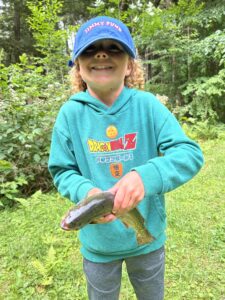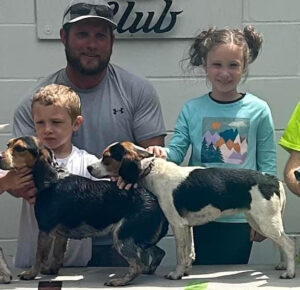While giving his annual deer report to the June 18 MA Fish & Game Board Meeting, DFW Deer & Moose Project Leader Martin Feehan recommended no changes in the number of antlerless permits to be issued in 2024. The number are the same as they were was in 2022 and 2023. Also, there have been no changes in the permit numbers in the individual wildlife management zones. The allocated permits are as follows:
Zone 1 – 800 allocations, Zone 2 – 400, Zone 3 – 2,050, Zone 4N – 800, Zone 4S – 600, Zone 5 – 1,950, Zone 6 – 400, Zone 7 – 3,000, Zone 8 – 3,100, Zone 9 – 7,200, Zones 10 and 11 – no cap, Zone 12 – 1,350, Zones 13 and 14 no cap.
Note, Zones 1 through 4 are the zones in our area:
Once again zones 10, 11, 13 and 14, in the eastern part of the state, have no caps on antlerless permits as they are still having troubles getting the deer population down to targeted deer densities.
Antlerless deer tags are allocated by zone based on population goals in that zone. Most hunters apply for their permit when they purchase their Massachusetts hunting license, but you can also apply online by going to MassFishHunt or in person by going to one of the MassWildlife District Offices or the MassWildlife Field Headquarters in Westborough.
The deadline for applying for an antlerless permit is July 16. If you apply, you still must check to see if you have been awarded the right to purchase the permit.
The award period begins August 1 at 8:00 am and ends on December 31. Your odds of obtaining a permit are the same regardless of when you check your permit status. You can check the status through MassFishHunt or by visiting a MassWildlife office or license agent location. There is no fee for the application, but those who are successful are required to pay a $10 fee.
Feehan also recapped some new proposed dealing with controlling the spread of Chronic Wasting Disease (a transmissible spongiform encephalopathy affecting deer. It is in a family of diseases thought to be caused by misfolded proteins called prions and include similar diseases such as mad cow disease in cattle, Creutzfeldt–Jakob disease in humans and scrapie in sheep.) One proposal is to set a sunset (phasing out) of Massachusetts facilities that raise captive deer. Another deals with expanding the deer deboning requirements.
Feehan further recapped proposed regulations that: 1) clarify that food plots are legal to hunt, 2) authorize deer decoys during archery season, 3) remove the daily antlerless bag limit, 4) authorize the youth deer permit for all season long, 5) exempt shed hunting from possession permit requirements and 6) create a winter primitive deer hunting season for the month of January in Wildlife Management Zones 13 and 14 (Martha’s Vineyard, Elizabeth Islands and Nantucket).
After considerable discussions, the Board approved moving the proposals forward to public meeting.
The specific verbiage for these proposals was not made available during the Board Meeting, and I am not able to expand further on them. I’m sure we will be hearing a lot more about them in the near future.
“It’s not the fishermen, but the fly”
Recently, I received the following email.
“A few weeks back, on a beautiful June evening, I was standing knee deep in a local river. Earlier, I had landed a couple decent browns; however, there were long dry spells in between. The fish were rising but no takers. This fellow fishing below me seemed to be hooking up on every other cast. In the fading light, with fish rising all around me, the fellow waded up to me and offered me his rod, taking mine in turn. I accepted the offer. Miraculously, I proceeded to land a nice brown followed very quickly by another and another and another. When it became too dark to see, the count had reached 5. I turned to the fellow, handed back his rod and thanked him. It was then I added, “It’s not the fishermen, but the fly.”
Kind of a weird email, right? What’s that all about? Gosh, that event seemed so familiar…like I experienced the same thing, …almost like an out-of-body experience. Then it dawned on me. The person in that story is me! The fellow who offered me the use of his rod and fly is a good friend and he actually wrote the article. He asked that if I included the story in this column, not use his name. “It will be our secret” he wrote, “as it is one of my most cherished memories fishing with a very special person.”
Aw, shucks.
Actually, it probably was the fisherman. A good fisherman not only knows the right fly to select, the size, color, the type of waters, the time to use it, etc. The other fisherman knew all that, I didn’t.
Thank you for that experience, my friend, and I won’t forget it either.
Report fish kills
Even though the vast majority of summer fish kills are natural events, to ensure there is not a pollution problem, MassWildlife advises us to a report all fish kills in lakes and ponds by calling the Environmental Police Radio Room at 1 (800) 632-8075
Natural fish kills are most often caused by low oxygen levels, fish diseases, or spawning stress. Depletion of dissolved oxygen is also a common cause. Water holds less dissolved oxygen at higher temperatures, and in shallower or weedier ponds, levels can drop further as plants consume oxygen at night. Fish spawning, including sunfish and bass spawning, occurs in late spring and early summer in shallow waters near shorelines. These densely-crowded areas can grow more susceptible to disease outbreaks as water temperatures rise. The result is an unavoidable natural fish kill, often consisting of only one or two species of fish.
Pittsfield Sportsmen’s Fishing Club derby
On June 8, the Pittsfield Sportsmen’s Club held a fishing derby at Reynolds Pond in Cheshire. According to club spokesperson Sandra Bushey, no one caught any of the 3 tagged trout. Nevertheless, the 8 kids who participated still had a great time.
Steve Bateman was there. ”Since putting on the (Jimmy Fund) derby, I really don’t get any fishing in prior to it.” said Steve, “ I only went out twice, once it was 36°. I recently got to take my nephew Christopher ‘Bub’ Bateman.” (Bub or Bubby is his family name) “He’s a nine year old student at Egremont School in Pittsfield. He has never caught a fish by himself until today at the Children’s Fishing Derby sponsored by the Pittsfield Sportsmen’s Club. I couldn’t be more proud of him. The way he cast, set the hook and brought the fish in. We still need to work on taking them off the hook, but I’m sure we’ll have that mastered in no time.”
“He caught his first fish, a rainbow trout then he caught other very nice brook trout. We kept three of them for his mom. It was a great experience for him. A big thank you to Dave Pemble and the rest of the crew of the Pittsfield Sportsmen’ Club for putting this event on.”
Ah, its good to see Steve just being an uncle and taking his nephew to a fishing derby without having the headaches and responsibility of overseeing a big event such as the Bateman Jimmy Fund Derby.
Good dogs, good food
On June 8, a SPO (Small Pack Option) Derby was held at the Berkshire Beagle Club on hares and cottontail rabbits. It was a one-day trial for dogs under 2 years old. Two classes were run, 13-inch and 15-inch., both classes combined males and females. Some thirty-two dogs in all were registered, nineteen 15” and thirteen 13”.
The winners were as follows: Zachary Johnson from Salem, NY took top honors in the 13” combined class, and Tony Roderick from Deighton, MA took top honors in the 15” combined class.
Berkshire Beagle Club member Bryon Faulkner took 2nd and 3rd places with his dogs 5 Pine Swamp’s Little Blue Ruby and Swamp’s Lunar Eclipse.
Coffee, juice and donuts were served in the morning. Wild turkey club sandwiches and rabbit pot pie gravy over biscuits for lunch. Umm, umm.


